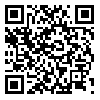Volume 1, Issue 3 (12-2014)
Human Information Interaction 2014, 1(3): 204-215 |
Back to browse issues page
Abstract: (6546 Views)
Background and Aim: This study attempts to propose a suggestive model for theorising in the field of Inquiry-Based Information Behaviour (IBiB).
Method: To achieve the research aim, Piaget’s Cognitive Development Theory, Dewey’s Constructivist Theory, as well as IBL Pedagogy were analysed. Taking into account the current information behaviour models and theories which are developed based on the so called theories, we employed deductive reasoning to propose our suggestive model. Methodologically, this interpretivist study is done based on library method and implemented qualitative content analysis technique.
Results: Admitting different cognitive competencies in different age-groups as well as the role of active experience in cognitive development, each child needs her own customized cognitive-appropriate experience to be able to engage with the learning process. The specific style and rate of cognitive development makes children unique learners.
Conclusion: The proposed preliminary conceptual model showed that active learning, open inquiry-based practices, and children’s personalized methods for responding to learning and cognitive needs, all have information ethos. And, children’s IBiB determines the extent to which they could succeed in the above processes. Testing this hypothesis, the IBiB theory which explains this phenomenon needs to be developed.
Method: To achieve the research aim, Piaget’s Cognitive Development Theory, Dewey’s Constructivist Theory, as well as IBL Pedagogy were analysed. Taking into account the current information behaviour models and theories which are developed based on the so called theories, we employed deductive reasoning to propose our suggestive model. Methodologically, this interpretivist study is done based on library method and implemented qualitative content analysis technique.
Results: Admitting different cognitive competencies in different age-groups as well as the role of active experience in cognitive development, each child needs her own customized cognitive-appropriate experience to be able to engage with the learning process. The specific style and rate of cognitive development makes children unique learners.
Conclusion: The proposed preliminary conceptual model showed that active learning, open inquiry-based practices, and children’s personalized methods for responding to learning and cognitive needs, all have information ethos. And, children’s IBiB determines the extent to which they could succeed in the above processes. Testing this hypothesis, the IBiB theory which explains this phenomenon needs to be developed.
Type of Study: Research |
| Rights and permissions | |
 | This work is licensed under a Creative Commons Attribution-NonCommercial 4.0 International License. |



